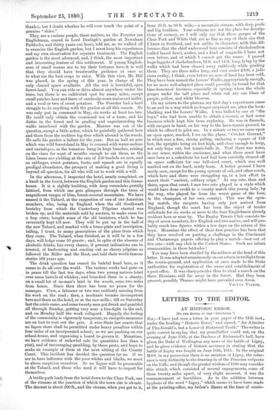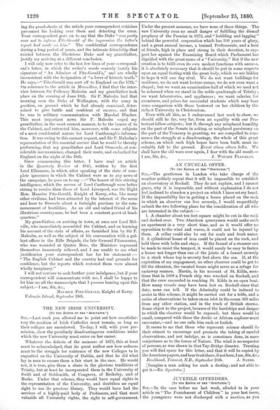LETTERS TO THE EDITOR.
AN HISTORIC ERROR.
[To Tug EDITOR OF TUB"SPECTATOR.'] SIR,—I have just seen a letter in your paper of the 11th inst., under the heading " Historic Error," and signed, " An Admirer of Fitz-Gerald's, but a Lover of Historical Truth." The writer is quite correct in saying that my grandfather could not, on the evening of June 15th, at the Duchess of Richmond's ball, have given the Duke of Wellington any news of the battle of Ligny, and he gives evidence of historic accuracy in stating that the battle of Ligny was fought on June 16th, 1815. In the original MSS. in my possession there is no mention of Ligny, the refer- ence is very distinctly to the drawing-in of the Prussian outposts on the 15th; and though the greater wisdom of 1880 may consider this attack, which consisted of several engagements, some of them twenty miles apart, of very slight moment, it was the commencement of hostilities. As to the addition between hyphens of the word " Ligny," which seems to have been made at the printing-office, my father's illness at the time of receiv-
ing the proof-sheets of the article your correspondent criticises prevented his looking over them and detecting the error. Your correspondent goes on to say that the Duke "was pretty sure not to inform Fitz-Gerald of the impression the latter's report had made on him." The confidential correspondence during a long period of years, and the intimate friendship that existed between the illustrious Duke and my grandfather, justify my arriving at a different conclusion.
I will only now refer to the last few lines of your correspond- ent's letter, in which the writer's words scarcely justify his signature of " An Admirer of Fitz-Gerald's," and are wholly inconsistent with the designation of "a lover of historic truth." He says,—" Fitz-Gerald was sent off to England on the 17th." On reference to the article in Macmillan, I find that the inter- view between Sir Pulteney Malcolm and my grandfather took place on the evening of June 18th. Sir P. Malcolm had that morning seen the Duke of Wellington, with the army in position, on ground which he had already examined, deter- mined to give battle and confident of success, and that he was in military communication with Marshal Blucher. This most important news Sir P. Malcolm urged my grandfather, in the most earnest manner, to be the bearer of to the Cabinet, and entrusted him, moreover, with some subjects of a most confidential nature for Lord Castlereagh's informa- tion. It was owing to this earnest request, and Sir P. Malcolm's representation of tEe essential service that he would be thereby performing, that my grandfather and Lord Ormoude, at con- siderable inconvenience, changed their route, and embarked for England on the night of the 18th.
Since commencing this letter, I have read an article in the . Quarterly Review of 1845, written by the first Lord Ellesmere, in which, after speaking of the state of com- plete ignorance in which the Cabinet were as to any news of the campaign, he goes on to say :—" The bearer of this stirring intelligence, which the nerves of Lord Castlereagh were better strung to receive than those of Lord Liverpool, was the Right Hon. Maurice Fitz-Gerald, Knight of Kerry, who, like many other civilians, had been attracted by the interest of the scene and hour to Brussels about a fortnight previous to the com- mencement of hostilities. As an old and valued friend of his illustrious countryman, he had been a constant guest at head- quarters."
My grandfather, on arriving in town, at once saw Lord Mel- ville, who immediately assembled the Cabinet, and on learning his account of the state of affairs, as furnished him by Sir P. Malcolm, as well as the subject of his conversation with a gal- lant officer in the Rifle Brigade, the late General Fitzmaurice, who was wounded at Quatre Bras, the Ministers expressed themselves immensely relieved, and I am unable to see what justification your correspondent has for his statement :- " The English Cabinet and the country had real grounds for confidence, but the reports which restored them were almost wholly imaginary."
I will not venture to seek further your indulgence, but if your correspondent will communicate with me, I shall be happy to let him see all the manuscripts that I possess bearing upon this subject.—I am, Sir, &c.,



































 Previous page
Previous page